中考第一轮复习人教新目标八年级英语上册Unit 7-Unit10词汇短语复习课件
文档属性
| 名称 | 中考第一轮复习人教新目标八年级英语上册Unit 7-Unit10词汇短语复习课件 |  | |
| 格式 | pptx | ||
| 文件大小 | 212.4KB | ||
| 资源类型 | 试卷 | ||
| 版本资源 | 人教新目标(Go for it)版 | ||
| 科目 | 英语 | ||
| 更新时间 | 2025-02-24 16:20:53 | ||
图片预览

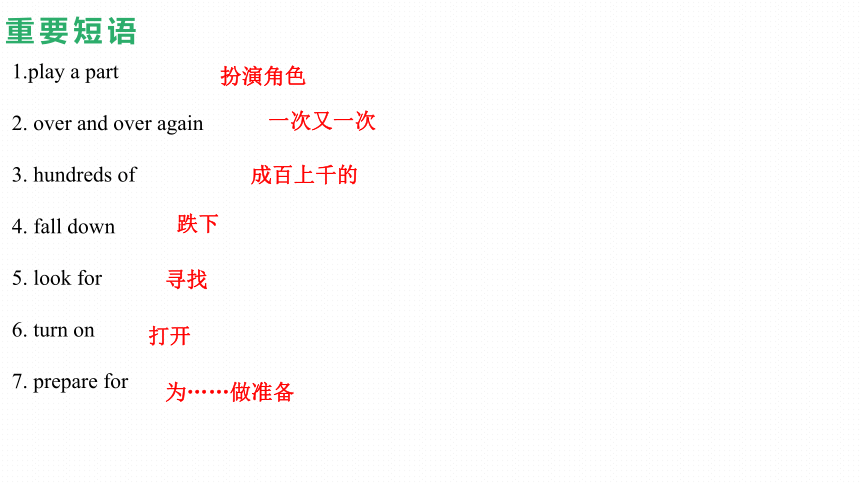
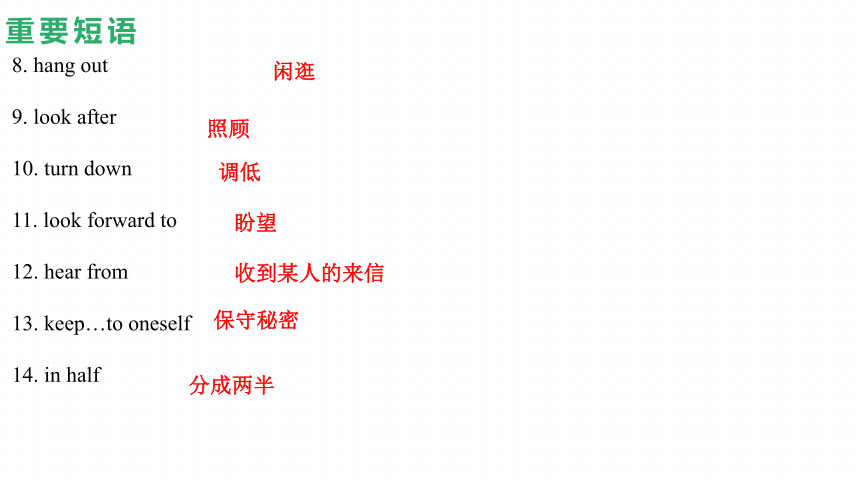
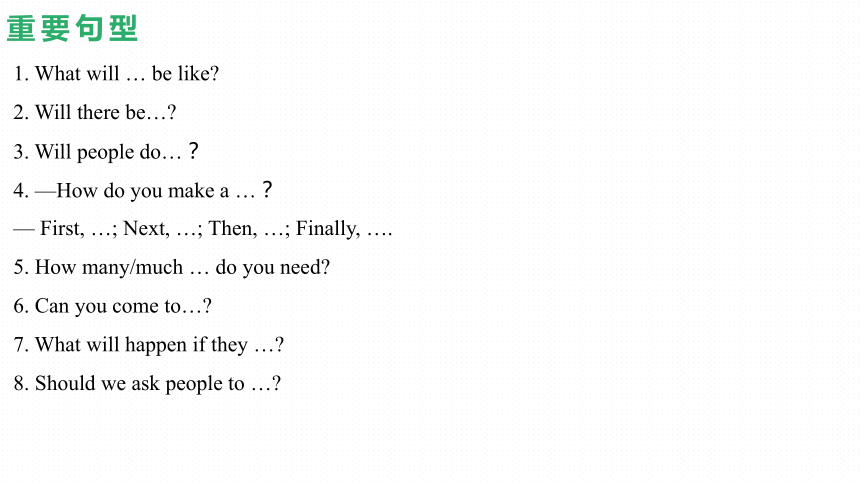

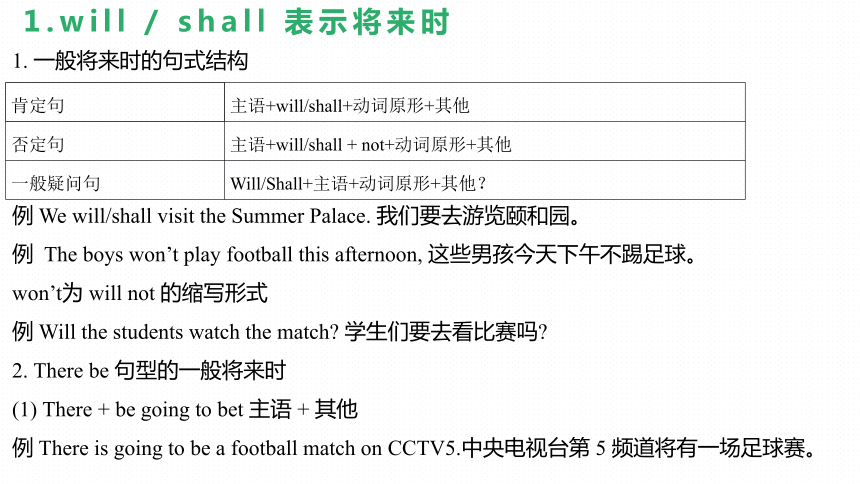
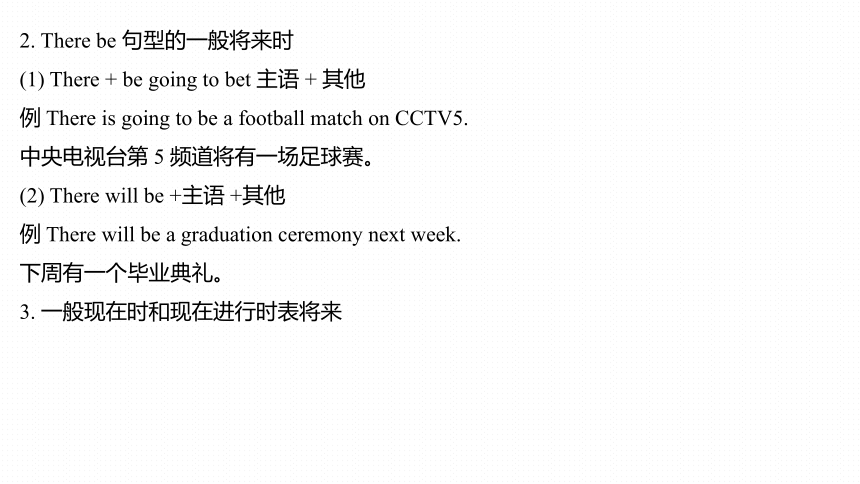
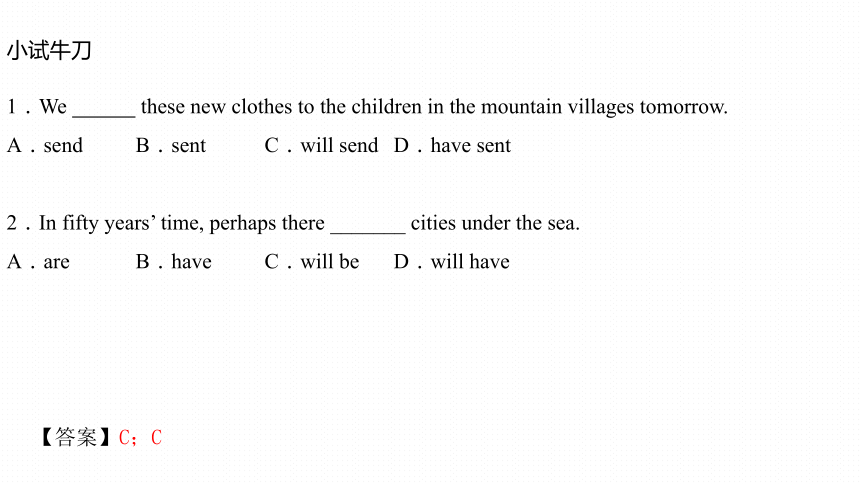
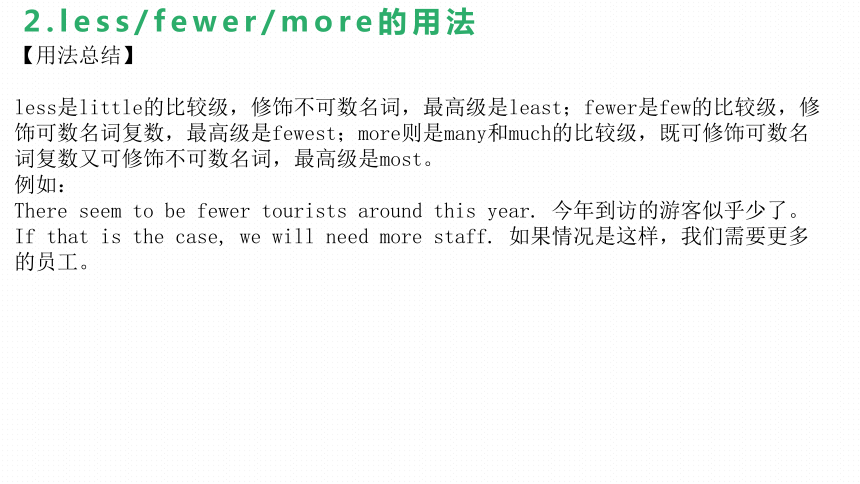
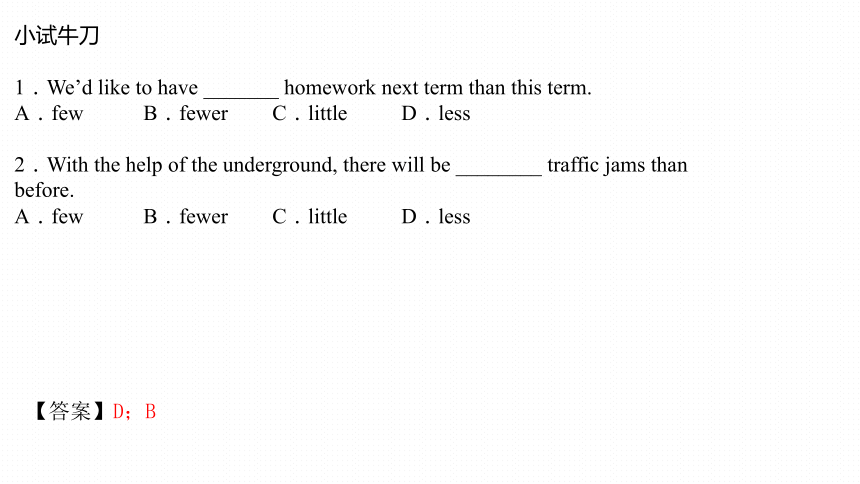
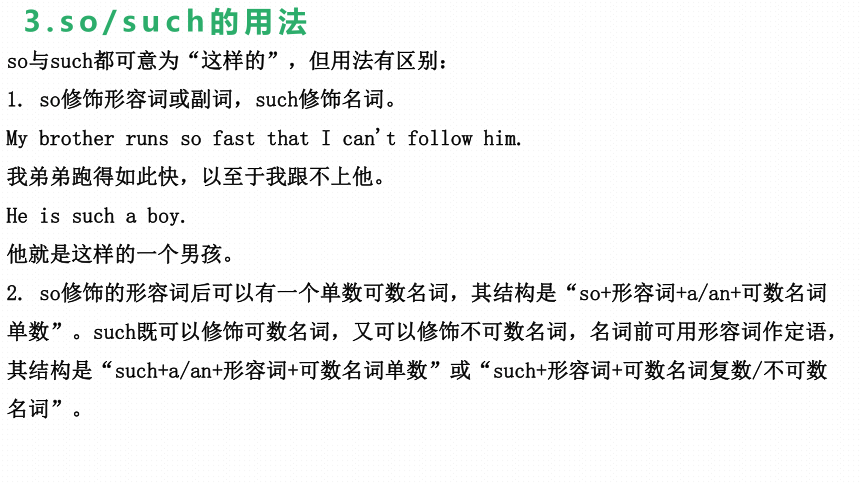
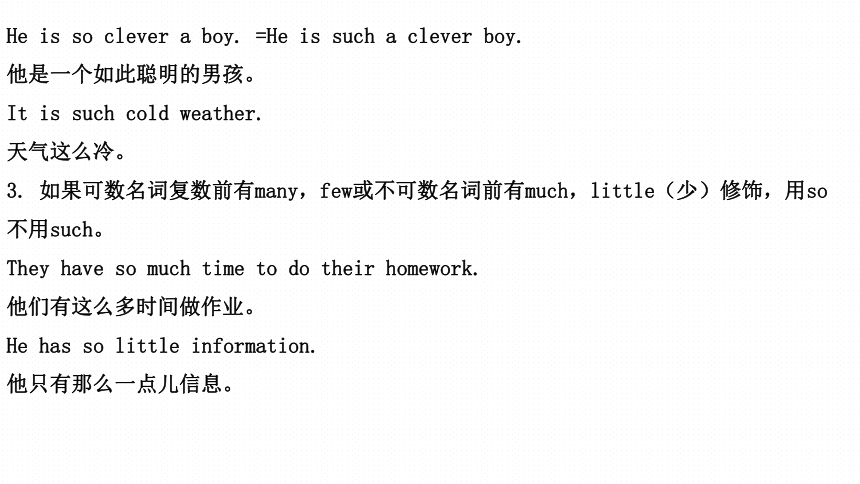
文档简介
(共41张PPT)
Unit 7-10词汇短语复习
八
最新人教版
上
单元总复习
/ 让教学更有效 高效备考| 英语学科
1.play a part
2. over and over again
3. hundreds of
4. fall down
5. look for
6. turn on
7. prepare for
重要短语
扮演角色
一次又一次
成百上千的
为……做准备
打开
跌下
寻找
8. hang out
9. look after
10. turn down
11. look forward to
12. hear from
13. keep…to oneself
14. in half
重要短语
闲逛
调低
收到某人的来信
照顾
盼望
保守秘密
分成两半
1. What will … be like
2. Will there be…
3. Will people do…?
4. —How do you make a …?
— First, …; Next, …; Then, …; Finally, ….
5. How many/much … do you need
6. Can you come to…
7. What will happen if they …
8. Should we ask people to …
重要句型
Unit 7-10
语法汇集
八年级
最新人教版
上
/ 让教学更有效 高效备考| 英语学科
1.will / shall 表示将来时
1. 一般将来时的句式结构
例 We will/shall visit the Summer Palace. 我们要去游览颐和园。
例 The boys won’t play football this afternoon, 这些男孩今天下午不踢足球。
won’t为 will not 的缩写形式
例 Will the students watch the match 学生们要去看比赛吗
2. There be 句型的一般将来时
(1) There + be going to bet 主语 + 其他
例 There is going to be a football match on CCTV5.中央电视台第 5 频道将有一场足球赛。
肯定句 主语+will/shall+动词原形+其他
否定句 主语+will/shall + not+动词原形+其他
一般疑问句 Will/Shall+主语+动词原形+其他?
2. There be 句型的一般将来时
(1) There + be going to bet 主语 + 其他
例 There is going to be a football match on CCTV5.
中央电视台第 5 频道将有一场足球赛。
(2) There will be +主语 +其他
例 There will be a graduation ceremony next week.
下周有一个毕业典礼。
3. 一般现在时和现在进行时表将来
小试牛刀
1.We these new clothes to the children in the mountain villages tomorrow.
A.send B.sent C.will send D.have sent
2.In fifty years’ time, perhaps there _______ cities under the sea.
A.are B.have C.will be D.will have
【答案】C;C
2.less/fewer/more的用法
【用法总结】
less是little的比较级,修饰不可数名词,最高级是least;fewer是few的比较级,修饰可数名词复数,最高级是fewest;more则是many和much的比较级,既可修饰可数名词复数又可修饰不可数名词,最高级是most。
例如:
There seem to be fewer tourists around this year. 今年到访的游客似乎少了。
If that is the case, we will need more staff. 如果情况是这样,我们需要更多的员工。
小试牛刀
1.We’d like to have _______ homework next term than this term.
A.few B.fewer C.little D.less
2.With the help of the underground, there will be ________ traffic jams than before.
A.few B.fewer C.little D.less
【答案】D;B
so与such都可意为“这样的”,但用法有区别:
1. so修饰形容词或副词,such修饰名词。
My brother runs so fast that I can't follow him.
我弟弟跑得如此快,以至于我跟不上他。
He is such a boy.
他就是这样的一个男孩。
2. so修饰的形容词后可以有一个单数可数名词,其结构是“so+形容词+a/an+可数名词单数”。such既可以修饰可数名词,又可以修饰不可数名词,名词前可用形容词作定语,其结构是“such+a/an+形容词+可数名词单数”或“such+形容词+可数名词复数/不可数名词”。
3.so/such的用法
He is so clever a boy. =He is such a clever boy.
他是一个如此聪明的男孩。
It is such cold weather.
天气这么冷。
3. 如果可数名词复数前有many,few或不可数名词前有much,little(少)修饰,用so不用such。
They have so much time to do their homework.
他们有这么多时间做作业。
He has so little information.
他只有那么一点儿信息。
【答案】B;C
1.The question is __________ difficult __________ few students can answer it.
A.suc; that B.so; that C.too; to D.to; too
2.Tina played the violin ________ carefully ________ she missed lunchtime.
A.such; that B.enough; to C.so; that
辨析 there be/have
1. there be 表示“某地/某时有某人/某物”,强调的是客观存在的东西。there be句型的构成形式一般为“There be+某物/某人十介词+某地/某时”。there be句型中be动词应和其后出现的主语在数上保持一致,如果是几个并列名词作主语,则采用“就近”原则。
There is a pen on the desk.
书桌上有支钢笔。
There is a box and two bottles on the desk.
书桌上有一个盒子和两个瓶子。
4.there be和have的用法
【拓展】
there be句型的一般将来时结构为“There will be.../There is/are going to be...”。
2. have表示“某人/某物有……”,强调所属关系。指主观上拥有某物。
Tom has a pen. 汤姆有支钢笔。
【答案】A;C
1.There ________ more cars in two years in cities. The cities are getting more and more crowded.
A.will be B.is going to be C.will have D.are going to have
2.There ________ still many vegetables in the fridge. We don’t need to go to the market.
A.is B.was C.are D.were
【用法总结】
turn on意为“打开(电灯、煤气、自来水、无线电等)”,其反义词组是turn off“关闭(自来水、煤气、电灯等)”。
It's too dark. Please turn on the light.
太暗了,请开灯。
Please turn off the TV when you leave the room.
你离开房间时,请关电视。
温馨提示
“开/关门、窗、盒子等”用动词open和close。
辨析 turn on/turn of/turn down/turn up
5.turn on的用法
1. turn on意为“接通(电流、煤气、水等);打开”,其反义词组为turn off。
2. turn down意为“(把收音机的音量等)关小、调低”,其反义词组为turn up。
温馨提示
这些短语中on,off,down,up都是副词,人称代词作宾语时,人称代词要放在副词的前面。
The radio is very loud. Can you turn it down a little, please
收音机声音非常大,请你调低一点儿好吗
练一练:
1.The twins couldn’t stop ________ the TV as soon as they got home. The basketball match was still _______.
A.to turn on;playing B.turning on;playing
C.to open;having D.turning on;on
2.The plane is about to ____________, please____________ your mobile phone.
A.put off; turn down B.take off; turn off
C.take away; put off D.put up; turn down
【答案】D;B
【用法总结】
how many意为“多少”,后接可数名词的复数形式,用来提问可数名词的数量。
—How many books do you have 你有多少本书
—About 50. 大约50本。How many monkeys are there in the zoo
动物园里有多少只猴子
【拓展】
how much意为“多少”,询问不可数名词的数量,后接不可数名词;how much还可以用来询问物品价格。
How much milk is there in the cup 杯子里有多少牛奶
—How much is the coat 这件上衣多少钱 —80 yuan. 80元。
6.how many/how much的用法
练一练:
1.You have to make sure that ________ spoons of butter and ________ lettuce you need before making the sandwich.
A.how much; how many B.how many; how much C.how much; how much
2.—How much is the laptop on show
—It’s about 5,000 yuan. Many young people like it.
A.What’s the colour of B.What’s the weight of C.What’s the price of
【答案】B;C
辨析 until/not...until
例如:Let’s wait until the rain stops.
咱们等雨停了吧。
I won’t go until I’m good and ready.我要完全准备就绪后才走。
7.until conj. &prep.到……时;直到……为止
until 直到……为止 所修饰的动词须是延续性的
not...until 直到……才 所修饰的动词不必是延续性的
练一练
1.—I’m looking forward to the opening ceremony of the 20th Games of Jiangsu Province. ________ will it take place
—________ 28th August, 2022.
A.When; Until B.How long; Not until C.When; Not until D.How long; Until
2.The lazy boy ________ go to school________ 9 o’clock yesterday morning.
A.didn’t; when B.doesn’t; until C.won’t; when D.didn’t; until
【答案】C;D
【用法总结】
辨析 if/unless
1. unless=if...not“除非;如果不”,引导条件状语从句。
2. 含有f引导的条件状语从句的复合句的常见用法:
(1)如果主句是一般将来时,从句要用一般现在时表将来。
If it doesn't rain tomorrow, we will go to the park.
如果明天不下雨,我们将去公园。
(2)如果主句是祈使句或含有情态动词,从句应用一般现在时表将来。
If you have questions, please ask me.
你如果有问题,请问我。
8.if conj.如果;是否
If people have problems, they should talk to other people.
如果人们遇到难题的话,他们应该和其他人交谈。
3. if引导宾语从句时相当于whether,意为“是否”。宾语从句要用陈述语序。
(1)主句为一般现在时,从句根据需要选用任意一种时态。
(2)主句为一般过去时,从句则用过去的某种时态,真理、谚语等除外。
练一练:
1.The football match will be put off (推迟) if it ________.
A.will rain B.rains C.won’t rain D.doesn’t rain
2.If there ________ no food at home, my Mum ________ to the supermarket to buy some.
A.will be; go B.will be; goes C.is; will go D.is; goes
【答案】B;C
【用法总结】
9.情态动词can的用法
1. 表示请求许可、允许。
Can we go home now 我们现在可以回家吗
2. 表示具有某种能力。
She can't speak Japanese. 她不会说日语。
3. 表示请求某人做某事。
Can you come to my party on Saturday afternoon
周六下午你能来参加我的聚会吗
4. can't 表示有把握的否定推测。
The wallet can't be Lucy's because hers is purple.
这个钱包不可能是露西的,因为她的钱包是紫色的。
5. can与could的区别
(1)can表示现在具有的能力,而could表示过去具有的能力。
(2)could可以表示请求许可、允许,但语气比can更委婉。
1.My mother ________ make rice dumplings. She’ll teach me how to do it.
A.must B.need C.should D.can
2.—Who is knocking on the door Is it your brother
—It ______ be him, Mom. He’s still at work.
A.can’t B.can C.must D.mustn’t
【答案】D;A
【用法总结】
10.busy的用法
busy作形容词,意为“忙的,繁忙的”,反义词为free。
I'm very busy so I have no time to see you.
我很忙,因此我没有时间见你。
(1)be busy with sth. 意为“忙于某事”。
He is busy with his homework.
他忙于他的家庭作业。
(2)be busy doing sth. 意为“忙于做某事”。
They are busy doing some shopping for Tom's birthday.
他们忙于为汤姆的生日购物。
→ They were made to go out of the classroom by the teacher.
(3) 如果宾语的不定式有宾语补足语时, 常用 it 作形式宾语, 而将真正的实语后置。
例 I find it not easy to lean to ride a bike. 我发现学骑自行车不太容易。
(4) 在 but, except等表示“除了……”之意的介词前, 若有动词do的某种形式,介词后作宾语的不定式常省略 to。
例 He does everything except go to school. 他怎么也不去上学。
2. 常见省略 to 的不定式结构
had better do sth. 最好做某事 would rather do sth. 宁愿做某事
cannot but do sth. 只好做某事 do nothing but do sth. 只好做某事
Why not do sth. 为什么 (不) 做某事
1.She is always busy _______ things and usually she won’t _______ them.
A.to find; look for B.to look for; find
C.looking for; find D.finding; look for
2.She was busy ________ for her exam and too busy ______ with me at that time.
A.preparing, to talking B.to prepare; talking C.preparing; talked D.preparing; to talk
【答案】C;D
【用法总结】
11.advice的用法
1. 是不可数名词,意为“建议”,可用some,much,a piece of,pieces of等修饰,不能说an advice 或many/a few advices。表示“有关……的建议”时,用介词on接名词、代词或“疑问词+不定式”。
Let's ask for his advice on what to do next.
关于下一步该怎么办咱们去征求一下他的意见。
2. 常见搭配:give advice on 对……提出建议
ask for advice征求意见
give sb. some advice 给某人一些建议
3. 其动词形式为advise,常见搭配:
advise sb. to do sth. advise doing sth. advise that sb. should do sth.
My teacher advises me to leave now. 老师建议我现在就离开。
He advised waiting till the proper time. 他建议等到适当时机(才行动)。
We advise measures should be taken to stop pollution at once. 我们建议立即采取措施以阻止污染。
1.—What was your Art course like
—The adviser gave ________ Chinese paintings. It’s a meaningless course for me.
A.little advise about B.few advices about C.little advice on D.much advise on
2.—Could you give me some advice on how to solve this problem
—Sorry. I don't know, either. But I advise you ________ Miss Yang for help.
A.ask B.asked C.asking D.to ask
【答案】C;D
【用法总结】
12.famous的用法
famous意为“著名的,出名的”,常用搭配:
be famous for...因……而出名
be famous as...作为……而出名
Lu Xun is famous for his works.
鲁迅因其作品而出名。
She is famous as an actress.
她作为一名女演员而出名。
1.Shanghai is famous ______ the Bund and its night views.
A.in B.for C.by D.with
2.Tea is famous ________ a symbol of Chinese culture and it is ________ with people around the world.
A.for; popular B.as; friendly C.as; popular D.for; friendly
【答案】B ;C
Unit 7-10
基础练习
八年级
最新人教版
上
/ 让教学更有效 高效备考| 英语学科
1.If they ________ a party tonight, half the class ________. We have the final test tomorrow.
A.have, come B.have, will come C.have, won’t come D.will have, won’t come
2.—On my way to the bookstore, I saw Mary hanging out with her friends.
—It ________ be her. She has gone to Beijing.
A.can’t B.mustn’t C.might
3.—________ lemons do you want
—Two, please. And ________ are they
—They’re 7 yuan.
A.How much; how much B.How many; how many
C.How many; how much D.How much; how many
4.There is going to ________ a school meeting this Friday.
A.has B.be C.have D.is
5.The man is ________ old ________ he couldn’t walk too long.
A.too; to B.so; that C.such; that
一、单项选择
答案:CACBB
二、阅读理解
How can you remember a song for a long time Why does your teacher use songs to teach you English There is a scientific reason for this.
Researchers (研究者) are studying the relationship between music and remembering a foreign language. “Singing could be a new way of learning, especially for a foreign language. The brain likes to remember things in a catchy (悦耳易记的) and relaxing way. For example, children can remember difficult words quickly when they are in a song,” said Dr. Karen Ludke. If children find it difficult to learn foreign languages, this new way may help. On his blog (博客), Dr. Ludke wrote, “A listen-and-repeat singing way can help to learn foreign languages and open the door for future research in this area.”
Many language teachers know the importance of music and they often use it in teaching and learning. Hua Zhuying, a teacher at a Chinese language school in Washington D.C., likes using songs in teaching Chinese. She said, “I use music all the time to teach children Chinese. For little kids, we usually use
English songs but teach them the Chinese lyrics. Not only does it work, but it is fun for children. Sometimes I think if I learned English that way when I was young, maybe I could speak English much better.”
Our brain likes music in learning languages, especially for remembering. If you are still having problems in learning a language, why not try singing it out 1. Why can singing help people learn foreign languages
A.Because people can learn languages from the lyrics.
B.Because it’s easier for brain to remember things in this way.
C.Because singing songs is very popular all around the world.
D.Because singing makes people happy.
2. What does the underlined word “them” in Paragraph 3 refer to (指的是)
A.Little kids. B.English songs.
C.Languages. D.Chinese lyrics.
3. According to the passage, which of the following is TRUE
A.Many language teachers often use music in teaching and learning.
B.Our brain can easily remember things in a slow and difficult way.
C.Playing computer games is a new way to learn a foreign language.
D.Hua Zhuying is a student at a Chinese language school in Washington D.C.
4. According to this text, who likes using songs in teaching Chinese
A.A researcher. B.Dr. Karen Ludke.
C.Hua Zhuying. D.The writer.
5. What’s the best title of this passage
A.The Importance of Music
B.A Great Foreign Language Teacher
C.Learning Foreign Languages in Music
D.How to Remember a Song for a Long Time
【答案】1.B 2.A 3.A 4.C 5.C
Many people go to different countries in their lifetime. Maybe one day you will go abroad as an exchange student. There are different table 1 (manner) in different countries. If you go to a 2 (west) country, do you know how 3 (behave) at the dinner table Here are some basic table manners. They are worth remembering.
To start 4 , put the napkin on your lap. This protects your clothes from food in your mouth. It can also 5 (use) to clean your hands and mouth.
Hold the knife in 6 (you) right hand and the fork in your left hand. Cut the meat 7 fish into pieces as you eat.
Do not reach across 8 table or in front of another person. Ask someone to pass whatever you want.
Try to be relaxed when having dinner. Eating in 9 (silent) isn’t any fun. But if you want to talk, remember to do it when you aren’t 10 (eat).
Use a handkerchief (手帕) when you cough or blow your nose.
【答案】1.manners 2.western 3.to behave 4.with 5.be used 6.your 7.or 8.the 9.silence 10.eating
Thank you!
Unit 7-10词汇短语复习
八
最新人教版
上
单元总复习
/ 让教学更有效 高效备考| 英语学科
1.play a part
2. over and over again
3. hundreds of
4. fall down
5. look for
6. turn on
7. prepare for
重要短语
扮演角色
一次又一次
成百上千的
为……做准备
打开
跌下
寻找
8. hang out
9. look after
10. turn down
11. look forward to
12. hear from
13. keep…to oneself
14. in half
重要短语
闲逛
调低
收到某人的来信
照顾
盼望
保守秘密
分成两半
1. What will … be like
2. Will there be…
3. Will people do…?
4. —How do you make a …?
— First, …; Next, …; Then, …; Finally, ….
5. How many/much … do you need
6. Can you come to…
7. What will happen if they …
8. Should we ask people to …
重要句型
Unit 7-10
语法汇集
八年级
最新人教版
上
/ 让教学更有效 高效备考| 英语学科
1.will / shall 表示将来时
1. 一般将来时的句式结构
例 We will/shall visit the Summer Palace. 我们要去游览颐和园。
例 The boys won’t play football this afternoon, 这些男孩今天下午不踢足球。
won’t为 will not 的缩写形式
例 Will the students watch the match 学生们要去看比赛吗
2. There be 句型的一般将来时
(1) There + be going to bet 主语 + 其他
例 There is going to be a football match on CCTV5.中央电视台第 5 频道将有一场足球赛。
肯定句 主语+will/shall+动词原形+其他
否定句 主语+will/shall + not+动词原形+其他
一般疑问句 Will/Shall+主语+动词原形+其他?
2. There be 句型的一般将来时
(1) There + be going to bet 主语 + 其他
例 There is going to be a football match on CCTV5.
中央电视台第 5 频道将有一场足球赛。
(2) There will be +主语 +其他
例 There will be a graduation ceremony next week.
下周有一个毕业典礼。
3. 一般现在时和现在进行时表将来
小试牛刀
1.We these new clothes to the children in the mountain villages tomorrow.
A.send B.sent C.will send D.have sent
2.In fifty years’ time, perhaps there _______ cities under the sea.
A.are B.have C.will be D.will have
【答案】C;C
2.less/fewer/more的用法
【用法总结】
less是little的比较级,修饰不可数名词,最高级是least;fewer是few的比较级,修饰可数名词复数,最高级是fewest;more则是many和much的比较级,既可修饰可数名词复数又可修饰不可数名词,最高级是most。
例如:
There seem to be fewer tourists around this year. 今年到访的游客似乎少了。
If that is the case, we will need more staff. 如果情况是这样,我们需要更多的员工。
小试牛刀
1.We’d like to have _______ homework next term than this term.
A.few B.fewer C.little D.less
2.With the help of the underground, there will be ________ traffic jams than before.
A.few B.fewer C.little D.less
【答案】D;B
so与such都可意为“这样的”,但用法有区别:
1. so修饰形容词或副词,such修饰名词。
My brother runs so fast that I can't follow him.
我弟弟跑得如此快,以至于我跟不上他。
He is such a boy.
他就是这样的一个男孩。
2. so修饰的形容词后可以有一个单数可数名词,其结构是“so+形容词+a/an+可数名词单数”。such既可以修饰可数名词,又可以修饰不可数名词,名词前可用形容词作定语,其结构是“such+a/an+形容词+可数名词单数”或“such+形容词+可数名词复数/不可数名词”。
3.so/such的用法
He is so clever a boy. =He is such a clever boy.
他是一个如此聪明的男孩。
It is such cold weather.
天气这么冷。
3. 如果可数名词复数前有many,few或不可数名词前有much,little(少)修饰,用so不用such。
They have so much time to do their homework.
他们有这么多时间做作业。
He has so little information.
他只有那么一点儿信息。
【答案】B;C
1.The question is __________ difficult __________ few students can answer it.
A.suc; that B.so; that C.too; to D.to; too
2.Tina played the violin ________ carefully ________ she missed lunchtime.
A.such; that B.enough; to C.so; that
辨析 there be/have
1. there be 表示“某地/某时有某人/某物”,强调的是客观存在的东西。there be句型的构成形式一般为“There be+某物/某人十介词+某地/某时”。there be句型中be动词应和其后出现的主语在数上保持一致,如果是几个并列名词作主语,则采用“就近”原则。
There is a pen on the desk.
书桌上有支钢笔。
There is a box and two bottles on the desk.
书桌上有一个盒子和两个瓶子。
4.there be和have的用法
【拓展】
there be句型的一般将来时结构为“There will be.../There is/are going to be...”。
2. have表示“某人/某物有……”,强调所属关系。指主观上拥有某物。
Tom has a pen. 汤姆有支钢笔。
【答案】A;C
1.There ________ more cars in two years in cities. The cities are getting more and more crowded.
A.will be B.is going to be C.will have D.are going to have
2.There ________ still many vegetables in the fridge. We don’t need to go to the market.
A.is B.was C.are D.were
【用法总结】
turn on意为“打开(电灯、煤气、自来水、无线电等)”,其反义词组是turn off“关闭(自来水、煤气、电灯等)”。
It's too dark. Please turn on the light.
太暗了,请开灯。
Please turn off the TV when you leave the room.
你离开房间时,请关电视。
温馨提示
“开/关门、窗、盒子等”用动词open和close。
辨析 turn on/turn of/turn down/turn up
5.turn on的用法
1. turn on意为“接通(电流、煤气、水等);打开”,其反义词组为turn off。
2. turn down意为“(把收音机的音量等)关小、调低”,其反义词组为turn up。
温馨提示
这些短语中on,off,down,up都是副词,人称代词作宾语时,人称代词要放在副词的前面。
The radio is very loud. Can you turn it down a little, please
收音机声音非常大,请你调低一点儿好吗
练一练:
1.The twins couldn’t stop ________ the TV as soon as they got home. The basketball match was still _______.
A.to turn on;playing B.turning on;playing
C.to open;having D.turning on;on
2.The plane is about to ____________, please____________ your mobile phone.
A.put off; turn down B.take off; turn off
C.take away; put off D.put up; turn down
【答案】D;B
【用法总结】
how many意为“多少”,后接可数名词的复数形式,用来提问可数名词的数量。
—How many books do you have 你有多少本书
—About 50. 大约50本。How many monkeys are there in the zoo
动物园里有多少只猴子
【拓展】
how much意为“多少”,询问不可数名词的数量,后接不可数名词;how much还可以用来询问物品价格。
How much milk is there in the cup 杯子里有多少牛奶
—How much is the coat 这件上衣多少钱 —80 yuan. 80元。
6.how many/how much的用法
练一练:
1.You have to make sure that ________ spoons of butter and ________ lettuce you need before making the sandwich.
A.how much; how many B.how many; how much C.how much; how much
2.—How much is the laptop on show
—It’s about 5,000 yuan. Many young people like it.
A.What’s the colour of B.What’s the weight of C.What’s the price of
【答案】B;C
辨析 until/not...until
例如:Let’s wait until the rain stops.
咱们等雨停了吧。
I won’t go until I’m good and ready.我要完全准备就绪后才走。
7.until conj. &prep.到……时;直到……为止
until 直到……为止 所修饰的动词须是延续性的
not...until 直到……才 所修饰的动词不必是延续性的
练一练
1.—I’m looking forward to the opening ceremony of the 20th Games of Jiangsu Province. ________ will it take place
—________ 28th August, 2022.
A.When; Until B.How long; Not until C.When; Not until D.How long; Until
2.The lazy boy ________ go to school________ 9 o’clock yesterday morning.
A.didn’t; when B.doesn’t; until C.won’t; when D.didn’t; until
【答案】C;D
【用法总结】
辨析 if/unless
1. unless=if...not“除非;如果不”,引导条件状语从句。
2. 含有f引导的条件状语从句的复合句的常见用法:
(1)如果主句是一般将来时,从句要用一般现在时表将来。
If it doesn't rain tomorrow, we will go to the park.
如果明天不下雨,我们将去公园。
(2)如果主句是祈使句或含有情态动词,从句应用一般现在时表将来。
If you have questions, please ask me.
你如果有问题,请问我。
8.if conj.如果;是否
If people have problems, they should talk to other people.
如果人们遇到难题的话,他们应该和其他人交谈。
3. if引导宾语从句时相当于whether,意为“是否”。宾语从句要用陈述语序。
(1)主句为一般现在时,从句根据需要选用任意一种时态。
(2)主句为一般过去时,从句则用过去的某种时态,真理、谚语等除外。
练一练:
1.The football match will be put off (推迟) if it ________.
A.will rain B.rains C.won’t rain D.doesn’t rain
2.If there ________ no food at home, my Mum ________ to the supermarket to buy some.
A.will be; go B.will be; goes C.is; will go D.is; goes
【答案】B;C
【用法总结】
9.情态动词can的用法
1. 表示请求许可、允许。
Can we go home now 我们现在可以回家吗
2. 表示具有某种能力。
She can't speak Japanese. 她不会说日语。
3. 表示请求某人做某事。
Can you come to my party on Saturday afternoon
周六下午你能来参加我的聚会吗
4. can't 表示有把握的否定推测。
The wallet can't be Lucy's because hers is purple.
这个钱包不可能是露西的,因为她的钱包是紫色的。
5. can与could的区别
(1)can表示现在具有的能力,而could表示过去具有的能力。
(2)could可以表示请求许可、允许,但语气比can更委婉。
1.My mother ________ make rice dumplings. She’ll teach me how to do it.
A.must B.need C.should D.can
2.—Who is knocking on the door Is it your brother
—It ______ be him, Mom. He’s still at work.
A.can’t B.can C.must D.mustn’t
【答案】D;A
【用法总结】
10.busy的用法
busy作形容词,意为“忙的,繁忙的”,反义词为free。
I'm very busy so I have no time to see you.
我很忙,因此我没有时间见你。
(1)be busy with sth. 意为“忙于某事”。
He is busy with his homework.
他忙于他的家庭作业。
(2)be busy doing sth. 意为“忙于做某事”。
They are busy doing some shopping for Tom's birthday.
他们忙于为汤姆的生日购物。
→ They were made to go out of the classroom by the teacher.
(3) 如果宾语的不定式有宾语补足语时, 常用 it 作形式宾语, 而将真正的实语后置。
例 I find it not easy to lean to ride a bike. 我发现学骑自行车不太容易。
(4) 在 but, except等表示“除了……”之意的介词前, 若有动词do的某种形式,介词后作宾语的不定式常省略 to。
例 He does everything except go to school. 他怎么也不去上学。
2. 常见省略 to 的不定式结构
had better do sth. 最好做某事 would rather do sth. 宁愿做某事
cannot but do sth. 只好做某事 do nothing but do sth. 只好做某事
Why not do sth. 为什么 (不) 做某事
1.She is always busy _______ things and usually she won’t _______ them.
A.to find; look for B.to look for; find
C.looking for; find D.finding; look for
2.She was busy ________ for her exam and too busy ______ with me at that time.
A.preparing, to talking B.to prepare; talking C.preparing; talked D.preparing; to talk
【答案】C;D
【用法总结】
11.advice的用法
1. 是不可数名词,意为“建议”,可用some,much,a piece of,pieces of等修饰,不能说an advice 或many/a few advices。表示“有关……的建议”时,用介词on接名词、代词或“疑问词+不定式”。
Let's ask for his advice on what to do next.
关于下一步该怎么办咱们去征求一下他的意见。
2. 常见搭配:give advice on 对……提出建议
ask for advice征求意见
give sb. some advice 给某人一些建议
3. 其动词形式为advise,常见搭配:
advise sb. to do sth. advise doing sth. advise that sb. should do sth.
My teacher advises me to leave now. 老师建议我现在就离开。
He advised waiting till the proper time. 他建议等到适当时机(才行动)。
We advise measures should be taken to stop pollution at once. 我们建议立即采取措施以阻止污染。
1.—What was your Art course like
—The adviser gave ________ Chinese paintings. It’s a meaningless course for me.
A.little advise about B.few advices about C.little advice on D.much advise on
2.—Could you give me some advice on how to solve this problem
—Sorry. I don't know, either. But I advise you ________ Miss Yang for help.
A.ask B.asked C.asking D.to ask
【答案】C;D
【用法总结】
12.famous的用法
famous意为“著名的,出名的”,常用搭配:
be famous for...因……而出名
be famous as...作为……而出名
Lu Xun is famous for his works.
鲁迅因其作品而出名。
She is famous as an actress.
她作为一名女演员而出名。
1.Shanghai is famous ______ the Bund and its night views.
A.in B.for C.by D.with
2.Tea is famous ________ a symbol of Chinese culture and it is ________ with people around the world.
A.for; popular B.as; friendly C.as; popular D.for; friendly
【答案】B ;C
Unit 7-10
基础练习
八年级
最新人教版
上
/ 让教学更有效 高效备考| 英语学科
1.If they ________ a party tonight, half the class ________. We have the final test tomorrow.
A.have, come B.have, will come C.have, won’t come D.will have, won’t come
2.—On my way to the bookstore, I saw Mary hanging out with her friends.
—It ________ be her. She has gone to Beijing.
A.can’t B.mustn’t C.might
3.—________ lemons do you want
—Two, please. And ________ are they
—They’re 7 yuan.
A.How much; how much B.How many; how many
C.How many; how much D.How much; how many
4.There is going to ________ a school meeting this Friday.
A.has B.be C.have D.is
5.The man is ________ old ________ he couldn’t walk too long.
A.too; to B.so; that C.such; that
一、单项选择
答案:CACBB
二、阅读理解
How can you remember a song for a long time Why does your teacher use songs to teach you English There is a scientific reason for this.
Researchers (研究者) are studying the relationship between music and remembering a foreign language. “Singing could be a new way of learning, especially for a foreign language. The brain likes to remember things in a catchy (悦耳易记的) and relaxing way. For example, children can remember difficult words quickly when they are in a song,” said Dr. Karen Ludke. If children find it difficult to learn foreign languages, this new way may help. On his blog (博客), Dr. Ludke wrote, “A listen-and-repeat singing way can help to learn foreign languages and open the door for future research in this area.”
Many language teachers know the importance of music and they often use it in teaching and learning. Hua Zhuying, a teacher at a Chinese language school in Washington D.C., likes using songs in teaching Chinese. She said, “I use music all the time to teach children Chinese. For little kids, we usually use
English songs but teach them the Chinese lyrics. Not only does it work, but it is fun for children. Sometimes I think if I learned English that way when I was young, maybe I could speak English much better.”
Our brain likes music in learning languages, especially for remembering. If you are still having problems in learning a language, why not try singing it out 1. Why can singing help people learn foreign languages
A.Because people can learn languages from the lyrics.
B.Because it’s easier for brain to remember things in this way.
C.Because singing songs is very popular all around the world.
D.Because singing makes people happy.
2. What does the underlined word “them” in Paragraph 3 refer to (指的是)
A.Little kids. B.English songs.
C.Languages. D.Chinese lyrics.
3. According to the passage, which of the following is TRUE
A.Many language teachers often use music in teaching and learning.
B.Our brain can easily remember things in a slow and difficult way.
C.Playing computer games is a new way to learn a foreign language.
D.Hua Zhuying is a student at a Chinese language school in Washington D.C.
4. According to this text, who likes using songs in teaching Chinese
A.A researcher. B.Dr. Karen Ludke.
C.Hua Zhuying. D.The writer.
5. What’s the best title of this passage
A.The Importance of Music
B.A Great Foreign Language Teacher
C.Learning Foreign Languages in Music
D.How to Remember a Song for a Long Time
【答案】1.B 2.A 3.A 4.C 5.C
Many people go to different countries in their lifetime. Maybe one day you will go abroad as an exchange student. There are different table 1 (manner) in different countries. If you go to a 2 (west) country, do you know how 3 (behave) at the dinner table Here are some basic table manners. They are worth remembering.
To start 4 , put the napkin on your lap. This protects your clothes from food in your mouth. It can also 5 (use) to clean your hands and mouth.
Hold the knife in 6 (you) right hand and the fork in your left hand. Cut the meat 7 fish into pieces as you eat.
Do not reach across 8 table or in front of another person. Ask someone to pass whatever you want.
Try to be relaxed when having dinner. Eating in 9 (silent) isn’t any fun. But if you want to talk, remember to do it when you aren’t 10 (eat).
Use a handkerchief (手帕) when you cough or blow your nose.
【答案】1.manners 2.western 3.to behave 4.with 5.be used 6.your 7.or 8.the 9.silence 10.eating
Thank you!
